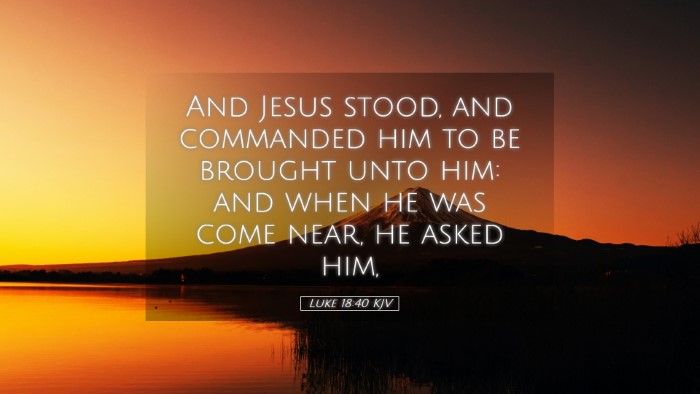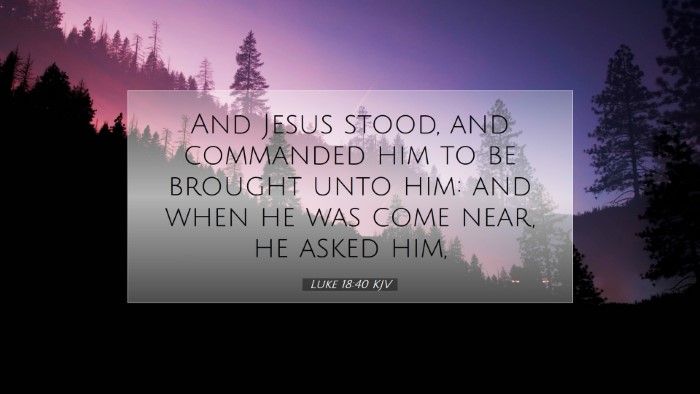Commentary on Luke 18:40
Luke 18:40 states, "And Jesus stood, and commanded him to be brought unto him: and when he was come near, he asked him." This pivotal moment in the Gospel of Luke underscores the compassionate nature of Christ and the importance of faith in healing and salvation.
Contextual Overview
The verse occurs within the narrative of Jesus’ journey to Jericho, where He encounters a blind beggar, often identified as Bartimaeus. This setting is significant as Jericho was known for its lushness and wealth, contrasting sharply with the plea of the destitute blind man. The healing that follows illustrates Jesus' authority and compassion, affirming the belief that no one is beyond the reach of His grace.
Insights from Public Domain Commentaries
Matthew Henry's Commentary
Matthew Henry emphasizes the deliberate actions of Jesus in this passage. He notes that Jesus "stood and commanded him to be brought", highlighting Jesus' proactive engagement in the healing process. This action illustrates not only His authority but also His willingness to reach out to those marginalized by society.
Henry also points to the blind man's faith, which is a recurring theme in the Gospel. He argues that faith is crucial in seeking Jesus: "He calls upon Jesus, and faith works through this call." Henry presents the blind man's persistence in the face of societal disinterest, suggesting that true faith persists even when others may discourage or ignore us.
Albert Barnes' Notes on the Bible
Albert Barnes provides insights into the implications of Jesus' command for the man to be brought closer. He notes, "Jesus did not overlook the individual, but saw his need and invited him into a closer relationship." This invitation reflects the broader theme of Jesus’ ministry, which is to invite those in need to come near and receive healing and hope.
Barnes also highlights the importance of the blind man's response upon being called, emphasizing that "responding to Jesus' call signifies faith in action." The act of coming close to Jesus not only symbolizes physical proximity but also spiritual readiness to receive what Jesus provides.
Adam Clarke's Commentary
Adam Clarke focuses on the role of the crowd in this narrative. He points out that the crowd attempted to silence the beggar, but the beggar shouted all the more. Clarke explains that this illustrates the "struggle of faith against external obstacles." The blind man's determination to press through societal barriers emphasizes a vital lesson about the nature of faith—it often requires overcoming the voices that seek to silence our cries for help.
Clarke also notes the significance of Jesus asking the man what he wishes to receive: "This question elicits a personal engagement and shows that Jesus desires to know the individual’s needs." It highlights the relational aspect of faith; Jesus is not merely a healer but also a personal Savior who understands and addresses our deepest needs.
Theological Reflections
This verse encourages reflection on the nature of calls to Jesus. It suggests that we should not allow societal pressures or personal doubts to hinder our approach to Him. As pastors and scholars, this calls us to consider how we might encourage those around us to persist in faith, even when the journey feels daunting.
Faith and Healing
The narrative also raises questions about the relationship between faith and healing. The blind man's faith is a precursor to his physical healing. This correlation is deeply significant for theological discussions surrounding the nature of healing in Scripture: "Faith, often, is a necessary precursor to divine intervention."
Contemporary Application
For modern-day application, Luke 18:40 challenges believers to act in faith despite obstacles. It posits that Christ is present and attentive to our cries, inviting a dialogue about our needs. The commentary of these theologians offers rich insights for pastors and laypeople alike, encouraging them to cultivate an environment where individuals feel empowered to cry out to Jesus regardless of their circumstances.
Conclusion
In conclusion, the early verses of Luke 18 provide a profound insight into Jesus’ ministry and His open invitation to all who are in need. The collective insights from Matthew Henry, Albert Barnes, and Adam Clarke illuminate the richness of this passage, urging all to come boldly to Jesus, trusting in His compassion and ability to heal both physically and spiritually.


